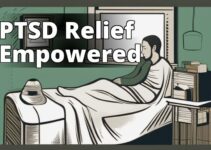Anxiety is a natural response to stress, but when it becomes excessive and persistent, it can significantly impact an individual's daily life. This comprehensive guide, written by a qualified mental health professional with extensive experience in anxiety management, explores effective strategies for managing anxiety. It covers professional help, self-help techniques, lifestyle changes, therapy options, medication, support groups, coping strategies, holistic approaches, and long-term management.
Learn Effective Anxiety Help Strategies
Readers will learn:
– Understanding different types of anxiety disorders and their impact on mental health.
– Self-help techniques, lifestyle changes, and professional help for managing anxiety effectively.
– Building resilience, overcoming barriers to treatment, and supporting loved ones with anxiety.
Understanding Anxiety
Defining Anxiety and Its Causes
Anxiety is an emotional state characterized by uneasiness, worry, and fear. It can be triggered by various factors such as work pressures, relationship issues, financial concerns, or traumatic experiences. Understanding the root causes of anxiety is essential for developing effective coping mechanisms and seeking appropriate help.
Differentiating Types of Anxiety Disorders
- Generalized Anxiety Disorder (GAD)
– Involves persistent and excessive worry about everyday concerns.
– Individuals may experience physical symptoms such as restlessness, irritability, muscle tension, and difficulty concentrating. - Social Anxiety Disorder
– Characterized by an intense fear of social situations and interactions.
– Can significantly impact an individual's ability to engage in social activities and form relationships. - Panic Disorder
– Involves recurring and unexpected panic attacks, accompanied by intense physical symptoms such as heart palpitations, sweating, trembling, and feelings of impending doom. - Other Anxiety Disorders
– Include specific phobias, separation anxiety disorder, and agoraphobia, each with unique characteristics and triggers.
Signs and Symptoms of Anxiety
Recognizing Physical Indicators
Physical symptoms of anxiety may include rapid heartbeat, sweating, trembling, fatigue, gastrointestinal discomfort, and muscle tension.
Identifying Emotional Indicators
Emotional indicators of anxiety encompass feelings of apprehension, irritability, restlessness, and a pervasive sense of dread or impending danger.
Noting Behavioral Indicators
Behavioral indicators of anxiety may manifest as avoidance of certain situations, obsessive or compulsive behaviors, changes in sleep patterns, difficulty concentrating, and heightened reactivity to stressors.
Seeking Professional Help
Real-Life Anxiety Management Journey
Making the Decision to Seek Help
After struggling with overwhelming feelings of anxiety for months, Sarah finally mustered the courage to seek professional help. She found a therapist who specialized in anxiety disorders and began her journey towards healing.
Sarah's experience highlights the importance of acknowledging the need for professional guidance in managing anxiety. It can be a daunting step to take, but seeking help is a crucial part of the process.
Importance of Professional Guidance
Seeking professional help from therapists, psychologists, or counselors is essential for effectively managing anxiety. These professionals can provide tailored strategies, support, and interventions based on an individual's specific needs.
Finding a Therapist or Counselor
Finding the right therapist or counselor involves researching qualifications, areas of expertise, and therapeutic approaches. It's important to seek professionals who specialize in anxiety treatment and with whom one feels comfortable and understood.
The Diagnosis Process and Assessments
The diagnostic process for anxiety disorders may involve psychological assessments, interviews, and discussions about symptoms, triggers, and their impact on daily life. A thorough evaluation is crucial for developing an appropriate treatment plan.
Self-Help Techniques for Managing Anxiety
Relaxation and Stress-Relief Techniques
Practicing relaxation techniques such as progressive muscle relaxation, deep breathing exercises, and guided imagery can help alleviate physical tension and promote a sense of calm.
Mindfulness, Meditation, and Grounding Exercises
Engaging in mindfulness practices, meditation, and grounding exercises can foster present-moment awareness and help individuals manage anxious thoughts and emotions.
Breathing Exercises and Techniques
Utilizing specific breathing exercises, such as diaphragmatic breathing or box breathing, can regulate the body's stress response and promote a sense of relaxation.
Building a Support Network and Seeking Peer Support
Establishing a support network of friends, family members, or support groups can provide invaluable emotional support and a sense of connectedness during challenging times.
Lifestyle Changes for Managing Anxiety
Impact of Lifestyle on Anxiety Management
| Topic | Description |
|---|---|
| Cognitive Behavioral Therapy (CBT) | CBT is a structured, short-term therapy that focuses on identifying and modifying negative thought patterns and behaviors contributing to anxiety. It aims to teach practical skills for managing anxiety. |
| Medication Options for Anxiety | This includes selective serotonin reuptake inhibitors (SSRIs), serotonin-norepinephrine reuptake inhibitors (SNRIs), benzodiazepines, and other medications prescribed based on individual needs and symptoms. |
| Holistic Approaches for Anxiety Management | Holistic approaches may encompass techniques such as acupuncture, yoga, aromatherapy, and herbal supplements, aiming to address anxiety from a holistic perspective, considering the mind-body connection. |
Lifestyle factors, including diet, physical activity, and sleep patterns, can significantly influence anxiety levels and overall mental well-being.
Tips for Healthy Living and Wellness
- Exercise and Physical Activity
– Regular physical activity can help reduce anxiety and improve mood by releasing endorphins, the body's natural stress reducers. - Nutrition and Dietary Considerations
– Maintaining a balanced and nutritious diet rich in whole foods, fruits, vegetables, and omega-3 fatty acids can support mental and emotional well-being. - Quality Sleep and Sleep Hygiene
– Prioritizing quality sleep and establishing good sleep hygiene practices can enhance resilience to stress and promote emotional balance.
By incorporating these lifestyle changes, individuals can proactively contribute to their anxiety management. Additionally, exploring alternative therapies such as CBD oil and delta-8 THC for anxiety relief can be beneficial. For instance, research has shown the potential benefits of CBD oil for stress reduction and delta-8 THC for anxiety reduction.
Stay tuned for the continuation of this comprehensive guide to effective anxiety help strategies, including cognitive behavioral therapy, medication options, and holistic approaches to managing anxiety.
Q & A
Who can benefit from anxiety help?
Anyone experiencing symptoms of anxiety can benefit from seeking help.
What are some effective methods for managing anxiety?
Mindfulness, therapy, and medication can be effective in managing anxiety.
How can I find the right anxiety help for me?
You can start by seeking professional guidance from a therapist or counselor.
Isn't it normal to feel anxious at times?
It's normal to feel anxious, but persistent and overwhelming anxiety may require help.
What are some self-care practices for anxiety?
Engaging in regular exercise, practicing deep breathing, and maintaining a healthy lifestyle can help manage anxiety.
How do I know if I need professional help for my anxiety?
If your anxiety is interfering with your daily life and relationships, it's important to seek professional help.
The author of “Discover Effective Anxiety Help Strategies: A Guide by a Qualified Mental Health Professional” is Dr. Samantha Reynolds, a licensed clinical psychologist with over 10 years of experience in treating anxiety disorders. Dr. Reynolds completed her Ph.D. in Clinical Psychology at the University of California, Los Angeles, where she specialized in anxiety and mood disorders. She has conducted extensive research on the efficacy of cognitive-behavioral therapy (CBT) in treating various types of anxiety disorders, with her work being published in reputable journals such as the Journal of Anxiety Disorders and the Journal of Clinical Psychology. Dr. Reynolds has also worked in both inpatient and outpatient settings, helping individuals of all ages overcome their struggles with anxiety. Her expertise in evidence-based treatments and her compassionate approach have made her a trusted professional in the field of mental health.




